#Duke of Brittany
Text
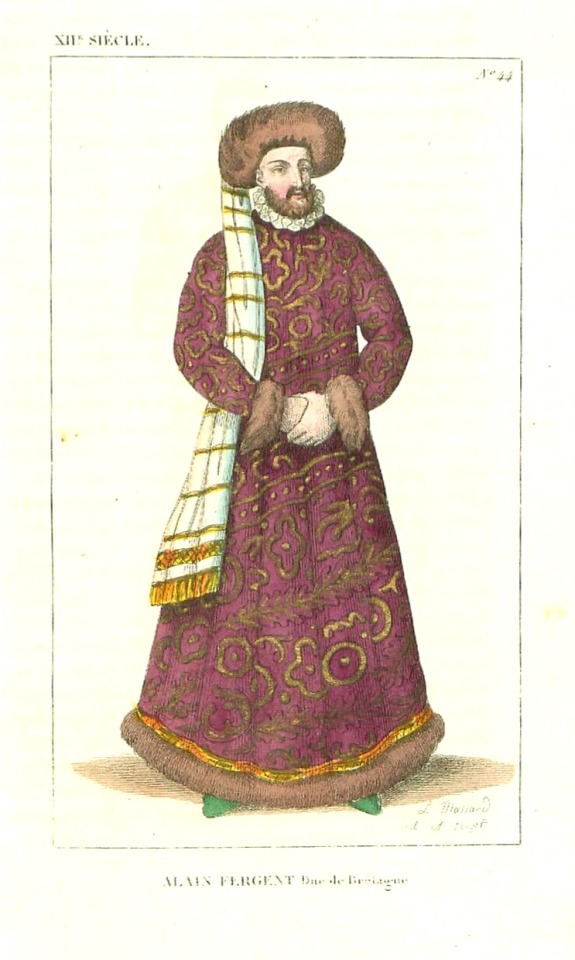
Alain Fergent, Duc de Bretagne.
Alain IV of Brittany (1060-1119), son of Hoël II of Brittany and Havoise of Brittany, was Count of Cornouaille, Rennes and Nantes and finally Duke of Brittany from 1084 to 1115.
#royaume de france#duché de bretagne#alain fergent#duc de bretagne#full length portrait#maison de cornouaille#duchy of brittany#duke of brittany#alain iv of brittany#full-length portrait#bretagne
4 notes
·
View notes
Text

"Hereafter follows the two Dukes of Brittany and Bourbon on horseback armed and with crests as if they were at the tourney."
by Barthélemy d'Eyck from Le Livre des tournois (Traicte de la Forme de Devis d'un Tournoi) or King René's Tournament Book
#medieval#middle ages#knights#knight#dukes#duke#brittany#bourbon#france#tournament#europe#european#armour#heraldry#crests#rené d'anjou#french#illuminated manuscript#history#art#mediaeval#tournaments#tourney#combat#duel
124 notes
·
View notes
Text
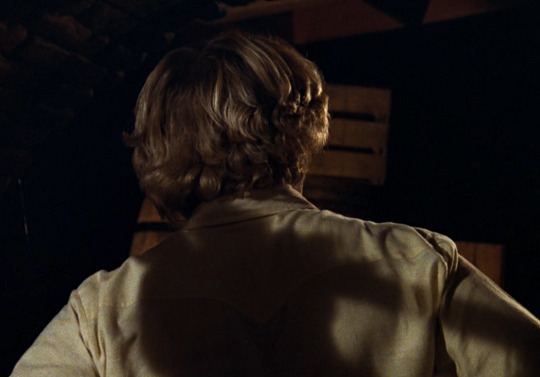
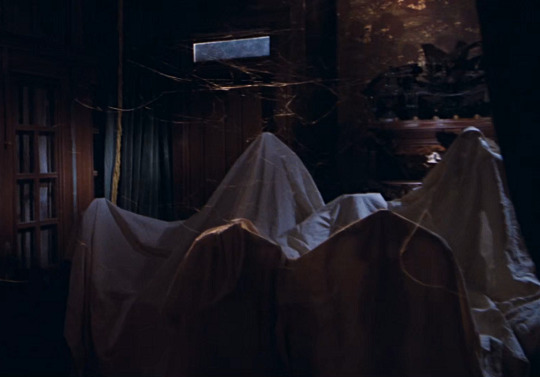
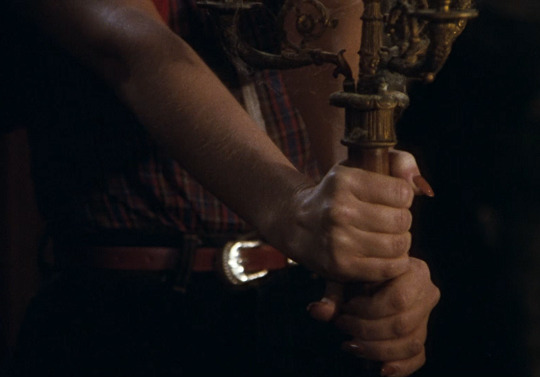
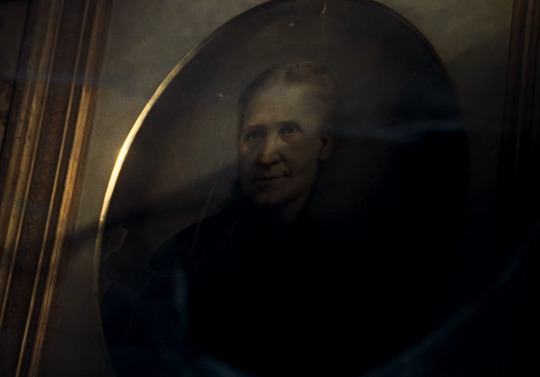
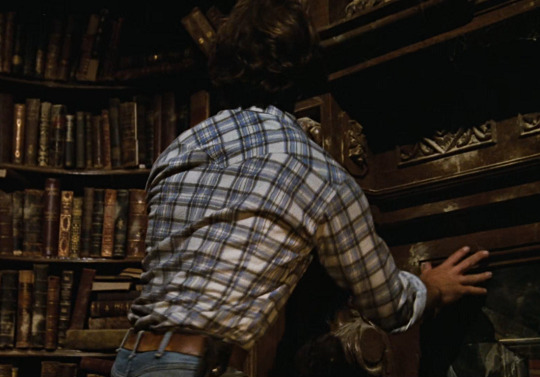
The Dukes of Hazzard - 3.04 - The Hazzardville Horror
29 notes
·
View notes
Text
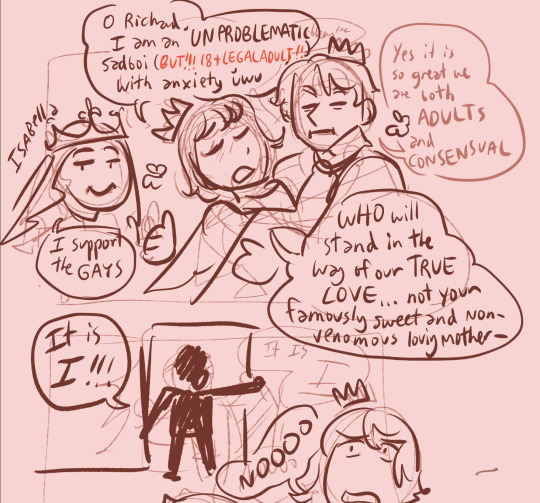

100% unproblematic medieval gays representationzzz
#richilippe#i guess#geoffrey duke of brittany#i love how he is the evil woman in the yaoi#Y’all know what this is about.#I’m sorry
18 notes
·
View notes
Text
Some Lion in Winter screen caps for all of our sorrows

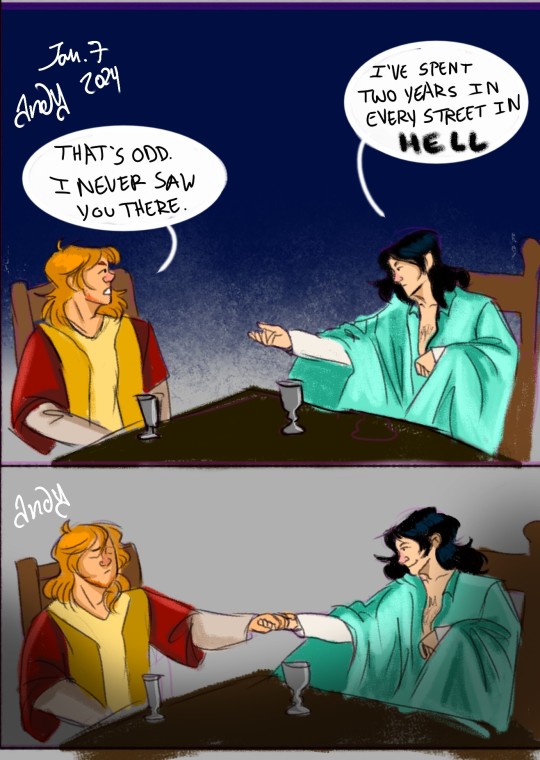
Wanted to go for more like... redhead/blond Plantagenets
#hobbit talks#andy rambles#hobbit draws#the lion in winter#plantagenets#medieval history#richard the lionheart#john lackland#phillipe augustus#geoffrey duke of brittany
11 notes
·
View notes
Text

AU: Modern AU where Anne Boleyn falls in love with Francis III, Duke of Brittany. (requested by anonymous)
Read on AO3
6 notes
·
View notes
Text

Henry Junior and Geoffrey devastate the countryside (1183)
6 notes
·
View notes
Photo




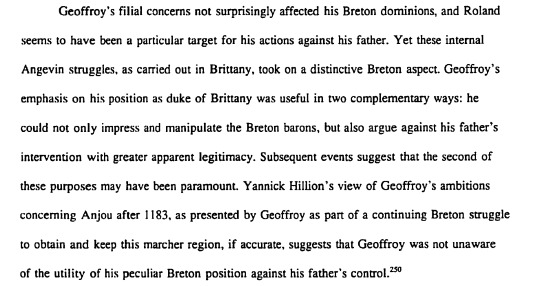


Jean Markale, Celtic Civilization
Eric Borgnis Desbordes, Arthur de Bretagne (1187-1203): L’Espoir breton assassiné
Mark Benton, To Embrace the King: The Formation of a Political Community in the French County of Anjou 1151—1247
Mari-Anna Sohier, Étude des actes de la duchesse Constance et de sa famille
Karen Jankulak, The Cult of St Petroc in Cornwall and Brittany c. 550 to c. 1250
Joëlle Quaghebeur, Prier Notre-Dame, protéger la Cornouaille
Judith Everard, Brittany and the Angevins: Province and Empire 1158-1203
#twelfth century#Duke Geoffrey#he's so funny to me#*geoffrey of brittany knocking on the glass noises* hey my family sucks can i use yours instead
9 notes
·
View notes
Quote
Henry VII’s neutrality in 1485–88 stemmed partly from his preoccupation with establishing his regime and rule in England and Ireland. But his solemn promise not to assist Duke Francis against the king of France seems to have been an important factor as well, for shortly after the death of Francis II, Henry radically reversed his policy and ended his neutrality. In the autumn of 1488, he agreed to send an army into Brittany at the Bretons’ expense, and to build a defensive alliance with Duchess Anne, Ferdinand and Isabella, and Maximilian.
John M. Currin, “England’s International Relations 1485–1509: Continuities amidst Change” | Tudor England and Its Neighbours
#henry vii#francis ii duke of brittany#charles viii#historian: john m. currin#tudor england and its neighbours
9 notes
·
View notes
Text
In the midst of these negotiations, in November 1395, John of Gaunt was negotiating with Jean IV for a marriage between the houses of Lancaster and Brittany for his grandson Henry (later Henry V) with Joan's daughter Marie, which would cement a bilateral alliance between them that Jean IV hoped would get the support he needed to get back both the honour of Richmond and control of Brest.While the matrimonial alliance suited both John of Gaunt and Jean IV, it did not suit Richard II, who reacted angrily to the news when John arrived back in England just after Christmas. Joan wrote two effusive letters to Richard II, in March 1396 and February 1397, to smooth over feathers ruffled by the proposed Lancastrian marriage. In both letters she stressed that she was “desirous to hear of your good estate” and stressed her maternal role by noting the good health of her children. She also noted the good health of her husband in the 1396 letter, with a gentle plea regarding the “the deliverance of his lands”, which appears to reference the ongoing dispute over the honour of Richmond or possibly the restoration of Brest. Joan signed off both letters with pledges that “if anything I can do over here will give you pleasure, I pray you to let me know it, and I will accomplish it with a very good heart, according to my power”.
Elena Woodacre, Joan of Navarre Infanta, Duchess, Queen, Witch? (Routledge, 2022)
#joan of navarre#richard ii#henry v#john of gaunt#jean iv duke of brittany#marie of brittany countess of alencon#historian: elena woodacre#marital negotiations
1 note
·
View note
Text
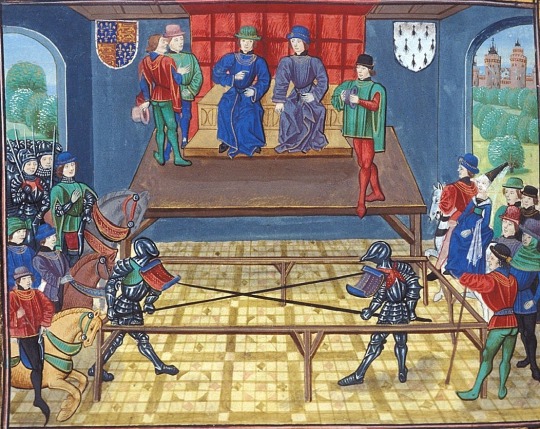
Jousting in Vannes, Brittany. The Earl of Buckingham (Thomas of Woodstock) and the Duke of Bretagne (John IV/V "The Conqueror")
Chroniques de Jean Froissart
#jousting#joust#knights#vannes#brittany#france#europe#european#history#medieval#england#knight#art#jean froissart#earl of buckingham#duke of bretagne#john the conqueror#thomas of woodstock#john iv#john v#combat#duel#chivalry#chivalric#coat of arms#heraldry
20 notes
·
View notes
Text
Episode 114 Gilles de Rais Saint or Scourge?
#bad#brittany#chateau#child#convicted#dabbler#de#du#duke#gillles#lude#murder#mystery#occult#orleans#play#rais#siege#spendthrift#tried
0 notes
Note
Having just rewatched the Lion in Winter, I am need of someone to vent to about all the ways Geoffrey is Eleanor but sterile. The way he's a mother-father surrogate for John and shepherds him around, all the while insulting and manipulating him. The way the cycle of parent-child relationships is continued in their strange attachment. They're constantly a pair despite at least one party always ready to sell out the other. Godd, why is there not more JohnGeoffrey stuff?
Also. 'And Richard? Promise him anything.' when your mother-lover prostitutes you out to your ex-boytoy situationship.
Idk. You seem like you would get it.
geoffrey in 68 TLIW and his toxic matronly vibes..I see u ehehe. Not enough John relationship explorations at all in general, I feel he gets brushed off a lot bc his scenes are goofy but especially in the play you can see how much more conflicted he is, in how he's painfully aware and frustrated that he's lacking. He tries to weakly push back against Henry (the "I'm not going on the birthday hunting trip!!!" Scene) but Henry basically shrugs and laughs him off. Just enough for Geoffrey to swoop in and play him...it's interesting that it works bc Geoffrey is seen to kind of be nicer to John, John (in the movie) is happy to see him when Geoffrey arrives, he brought presents...he plays up the "you and me we're in the same boat" younger bros teaming up to take on the oldest solidarity lmao. It's interesting also in the play how John also isn't above snarking at Geoffrey's expense too (he finds Geoffrey's "here I am father! I'm it" play in the end CRINGE and tells him as such in the dungeon). Geoffrey may be playing the Lucy Charlie Brown football movie on John every year but they still hang out and WILL be coordinating to invade Aquitaine later on lmaoooo...
Eleanor also ordering Rich around at the end of Act 1 is so good...so much implied before we even get to the Big Drama (and also her feigning ignorance when henry asks about it later.) Richard is always getting played in this movie, and he hates it, and he can't help following along and being a cog in everyone's plans (his whole assertion at the beginning where he's like "I WONT HAVE MY FEELINGS TAKEN ADVANTAGE OF...IM cool and stuff .." and then proceeds to get his heart raked all over the coals the rest of the play. Iconic of him
#Asks#Geoffrey Duke of Brittany#The lion in winter#tliw#Sorry I thought I answered this ages ago but realized it was still in drafts
4 notes
·
View notes
Text
So, why do people care so much about Cornish identity? Cornwall’s just a part of England right? Another county with some distinct foods and a funny accent, and they moan about the tourists- when they should be grateful for the money.
Except it’s not.
Whilst the rest of England was forming with a character influenced by Germanic and Norse cultures, Cornwall was holding itself separate as an independent Celtic kingdom, with strong links with Wales, Ireland and Brittany- as well as trading with the wider Mediterranean. For a long time, this kingdom included parts of Devon, but eventually the Celtic people were forced back past the Tamar, and at some point started referring to the land as Kernow, rather than Dumnonia (probably).
Even after the Norman conquest, in part because Cornwall came under the control of the Duke of Brittany, Cornwall retained elements of its unique culture, and certainly its language. There are existing works of literature written in the Cornish language (also called Kernewek) during the medieval period. Due to the active tin mining industry and the Stannary courts, they even had a separate legal system.
All of this continued until the start of the Tudor period, when Henry VII, desperate for money for his wars with Scotland, suspended the operation of the Cornish Stannaries, and imposed greater taxes. This ultimately led to the Cornish Rebellion of 1497. An army of as many as 15000 rebels marched towards Somerset, and ultimately to London, where the rebels met with Henry VII’s armies. Unfortunately, the Cornish lost the ensuing battle, and the rebel leaders were captured, killed and quartered, with their quarters being displayed in Cornwall and Devon. From 1497 to 1508, Cornwall was punished with monetary penalties, impoverishing the people, and land was given to the king’s (English) allies.
However, this wasn’t the death of Cornish culture or dreams of independence from England. Until 1548, Glasney college was still producing literature in Cornish- when it was destroyed in the dissolution of the monasteries, during the English reformation. The following year, 1549, the Cornish rose again- this time to demand a prayer book in their own language, which was still the first (and often only) language of most people in the region. The rebellion was also about the ordinary people vs the landowners, as shown by their slogan “kill all the gentlemen”.
Unfortunately, this rebellion failed too, and this time, it wasn’t just the leaders who were killed, but up to 5,500 Cornishmen- which would have been a significant proportion of the adult male population at the time. These factors combined are widely thought to have contributed to the decline of the Cornish language- although it was still widely in use centuries later.
Despite the failings of these rebellions, the Cornish retained a distinct language and their own culture, folklore and festivals. Mining, farming and fishing meant that the region itself wasn’t economically impoverished, as it was today. Even towards the end of the 1700s, there were still people who spoke Cornish fluently as a first language (including Dolly Pentreath, who definitely wasn’t the last Cornish speaker).
However, over time, the tin mines became less profitable, and Cornwall’s economy started to suffer. Especially in the latter part of the 19th century, many Cornish began to emigrate, especially to places like Australia, New Zealand (or Aotearoa), Canada and South America. Cornish miners were skilled, and were able to send pay back home, and along with the Welsh, influenced culture and sport in many of these places. Many mining terms also have their roots in Cornish language and dialect.
Throughout the 20th Century, Cornwall went through an economic decline- to the point where, when the UK was an EU member, Cornwall was receiving funding intended for only the most deprived regions in Europe. It was one of very few places in the UK to receive this funding- due to the levels of poverty and lack of infrastructure.
Part of the decline was also linked to the decline of historic fish stocks, such as mackerel. In the 70s and 80s, there was a mackerel boom- and large fishing trawlers came from as far away as Scandinavia (as well as Scotland and the north of England) to fish in Cornish waters. The traditional way of fishing in Cornwall used small boats and line fishing. The local fishermen couldn’t compete, and ultimately stocks were decimated by the trawlers. Many more families had to give up their traditional way of life. One could draw parallels here with worldwide indigenous struggles over fishing rights.
Despite this, Cornish communities retained their traditional folklore and festivals, many of which are still celebrated to this day. And throughout the 20th Century, efforts were made to preserve the Cornish language. Although there may not be any first language Cornish speakers left, it is now believed that community knowledge of the language was never truly lost.
Cornwall has since become a popular tourist destination. This brings its own problems- many people want to stay in self-catering accommodation and, more recently, air bnbs. This, alongside second homes, has gutted many Cornish communities. The gap between house prices and average wages is one of the largest in the country. Land has become extremely expensive, which hurts already struggling farmers. Roads can’t cope with the level of traffic. The one (1) major hospital can’t cope with the population in the summer. All of last winter, most Cornish households faced a “hosepipe ban” due to lack of water- yet in the summer, campsites and hotels can fill their swimming pools and hot tubs for the benefit of tourists.
Does this benefit Cornwall? Only about 13% of Cornwall’s GDP comes from tourism. The jobs associated with tourism are often poorly paid and may only offer employment for part of the year. People who stay in Air BnBs may not spend that much money in the community, and the money they pay for accommodation often goes to landlords who live upcountry and aren’t Cornish. Many major hotels and caravan sites are also owned by companies that aren’t Cornish, taking money out of the local economy.
Match this with a housing crisis where it’s increasingly difficult to rent properties long term, and buying a flat or house in Cornwall is out of reach of someone on the average salary and it’s easy to see why people are having to leave communities where their family lived for generations. This damages the local culture, and means centuries-old traditions can come under threat.
All of this feeds into the current situation; it feels like middle class families from London see Cornwall as their playground, and moan about tractors on the road, or the lack of services when they visit. People talk about theme park Cornwall- a place that’s built for entertainment of outsiders, not functionality for those who live here. More widely, a lot of people around the UK have never heard of the Cornish language, or view it as something that’s “extinct” or not worth preserving.
The Cornish are one of Britain’s indigenous cultures, alongside Welsh, Gaelic, Scots, Manx and others. And it’s a culture that’s increasingly under threat economically and culturally. We’ve been clinging on to our homes for a long time, and even now it still feels like we might be forced from them (indeed some of us are). So yes, Cornish people can seem excessively defensive about our identity and our culture- but there’s good reason for it!
#uk politics#cornwall#cornish#kernow#kernewek#celtic languages#minority languages#minority cultures#Cornish history#cornish langblr
274 notes
·
View notes
Photo

Medieval Brittany, 9th-14th century
« Atlas historique de la France », Les Arènes, 2020
by cartesdhistoire
The Brittany peninsula experienced an influx of people in the 6th century, including invaders from England. An independent Brittany emerged amidst the fragmentation of the Carolingian Empire and Viking raids. Nominoë, appointed representative of the emperor, established his sovereignty after defeating Charles the Bald at the Battle of Ballon in 845. His son, Erispoë, became king of Brittany in 851. Armorica became a duchy in 939 but remained de facto autonomous, under the influence of the Plantagenets (1148-1203) and then the Capetians (1203-1341). Brittany became a duchy-peerage of the Kingdom of France in 1239. In 1491, Duchess Anne married King Charles VIII of France, initiating a process that culminated in the Edict of Union definitively attaching Brittany to the kingdom in 1532.
Breton is spoken west of a Plouha-Loudéac-La Roche-Bernard-Batz line, which has remained relatively stable over time. From the 9th century, the entire eastern area of Brittany spoke Gallo, an Oïl dialect related to Norman and Angevin. This region includes Dol, the seat of the archbishopric until 1199, and cities such as Nantes and Rennes, where the States of Brittany convened from 1352.
The administrative language of Brittany was not Breton but Latin. French began to appear in the 1240s and became widely used between 1250 and 1280, a trend observed in other French regions during the same period. From the mid-13th century, counts of Champagne favored French for their feudal affairs. The Count of Blois definitively abandoned Latin in favor of French from 1267. The Dukes of Burgundy extensively used the vernacular language during the second half of the 13th century, with French becoming their exclusive language from Duke Eudes (1315-1349). Paradoxically, French only became the dominant language of the Chancellery of the kings of France later, under Philip VI (1328-1350).
79 notes
·
View notes
Text
Astro pt. 4
credit: @venuscnjunctpluto
(I can’t even remember which part I’m on😅)
*I fw Aquarius mars and Venus women they do what they want to do and they’re very smart (ex: Victoria pedretti, brittany renner, Taylor swift, and IceSpice)
*Ik men w these aspects gets dragged but I do like that they’re usually not bigoted☺️
* Ice spice also has a sag Venus and she’s openly rapped about being Bi
*pink pantheress has to be a Virgo rising and (edit: Ice Spice confirmed she was one too)
*taurus Venus or mars are the h*rniest it’s ridiculous. Kanye has an extreme p*rn addiction to the point people have walked in the studio and he’s causally watching it. He has a Taurus Venus and Mars😭
*For couples, moon in the 1st and 7th house synastry is very common
*Male friends usually have sun-mars or mars-mars aspects
*The arguing that comes w moon square mars synastry is not worth the sexual tension. I have a cardinal moon so all of those mfs can stay away from me pls😭
*Leo + Libra in big three is such popular cheerleader energy. I think that’s one reason Meghan gets a lot of hate because she is attention seeking yet she hasn’t done anything to warrant all the hate. It’s like disliking somebody but not having a reason so you get even more mad bc you look dumb
*Taurus risings voices are so hot😭😭 (ex: Miley Cyrus, gigi hadid, Austin butler)
*Underdeveloped fixed sign men become incels. Leo and Aquarius placements have huge egos so they can’t understand rejection. Leos feel that they’re so sweet and kind how can you not like me. Aquarius placements feel like nobody’s as smart and different as them. I don’t even need to explain Taurus and Scorpio (lol I’m never gonna stop dragging them)
*I should’ve known I was an Aries rising considering how many Aries mars come after me. Asap rocky is a Aries mars and both his ex Kendall and rihanna have Aries risings and moons. Also Aries rising women have such “tall gf who shares her bfs clothes” vibes (ex: Joe Jonas and Sophie Turner + Asap and Rihanna)
*As an aqua sun Aries rising the combination I can’t resist is aqua Venus + Aries mars…Jack Harlow is included in that
*I think what drew Harry to Meghan is her cancer rising considering his mother Diana is a cancer sun. My brother in law’s mom was a Leo sun and my sister is a late cancer rising. A guy I talked to has a Taurus sun mom and I’m a late Aries rising. Having sun in the 1st w your partners parent might be a thing.
*Y’all see those memes where Beyoncé looks all majestic and calm while Jay z looks lost and confused. He’s a sag sun + Pisces rising and she’s a libra rising + Virgo sun.
*Jay z definitely has a type…I’m not about to get into the gross age gaps but both foxy brown and Beyoncé are Virgo suns w Scorpio moons, libra venuses, and a Leo placement…wow
*Dababy thinks he’s allll that whole time he has Venus conjunct Pluto. Attracting Scorpio women who were gonna lose their minds in a relationship any mf ways like sir bye. Danileigh has a Scorpio Venus btw
Streamers
*They call Duke Dennis the “king of rizz” yep well he has mars square Pluto. Once again that’s a sign of male magnetism
*Streamers have a lot of Plutonian energy it’s interesting…Adin Ross has a Scorpio Venus, DDG and Kai Cenat have Venus conjunct pluto while Speed has mars conjunct Pluto.
*Kai is also a Pisces mars which explains his sad puppy dog eyes 🥺
*Halle Bailey has Venus square pluto while DDG has a conjunction everybody was screaming for them to break up and whole time I’m just like 😅. Once again her vibe is alluring as a woman w this aspect while his is…anywho
*Adin Ross also have a Virgo mars which is such 🤓 energy

697 notes
·
View notes